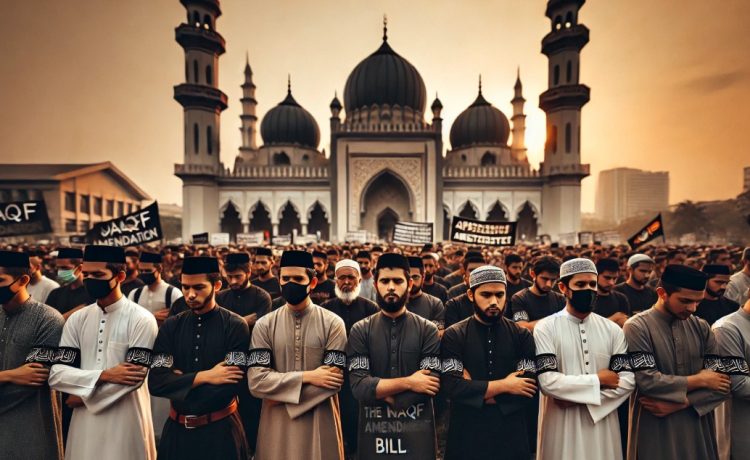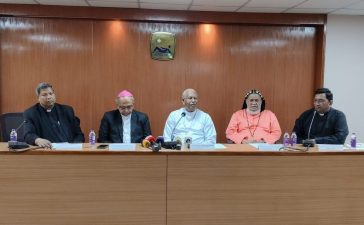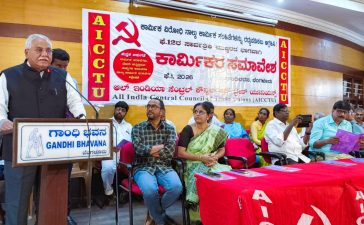Political Pressure Mounts as AIMPLB Mobilizes Against Waqf Amendment Bill
Silent Protest Across India
The All India Muslim Personal Law Board (AIMPLB) has called for a silent black-band protest on Jumatul Vida, the last Friday of Ramzan, in opposition to the proposed Waqf Amendment Bill. Muslims across the country have been urged to wear black bands on their right arms during Friday prayers as a mark of protest against the controversial legislation.
Protests Gain Momentum in Patna and Vijayawada
The call for protest comes in the wake of demonstrations held in Patna, Bihar, and Vijayawada, Andhra Pradesh, where AIMPLB members and leaders voiced their strong opposition to the bill. A separate protest was also held at Jantar Mantar in New Delhi, drawing participation from key AIMPLB figures, including Hyderabad MP Asaduddin Owaisi.
No Immediate Plans for Protests in Hyderabad
AIMPLB President Maulana Khalid Saifullah Rahmani clarified that while no protests are currently planned in Hyderabad or Telangana, the board is prepared to escalate its agitation if the bill is passed.
“If the bill is enacted, we will call for nationwide protests within constitutional limits, including in Hyderabad. However, at present, the Congress party’s stance on the bill remains clear, and no demonstrations have been scheduled in Telangana,” Maulana Rahmani stated.
Political Pressure on NDA Allies
Insiders within AIMPLB suggest that the protests in Bihar and Andhra Pradesh are strategically aimed at pressuring the respective state governments led by Nitish Kumar’s JD(U) and Chandrababu Naidu’s TDP, both of whom are allies of the National Democratic Alliance (NDA). The board hopes to garner political resistance against the bill within these key states.
Concerns Over the Waqf Amendment Bill
Critics, including politicians and activists, argue that the Waqf Amendment Bill poses a serious threat to the protection of waqf properties. The primary concerns revolve around the removal of the “waqf-by-user” provision, the dissolution of Waqf Tribunals, and the transfer of waqf-related decision-making to district collectors.
The AIMPLB, along with other stakeholders, continues to demand the withdrawal of the bill, warning that nationwide demonstrations will intensify if the proposed amendments become law.
Q & A on AIMPLB’s Black-Band Protest Against the Waqf Amendment Bill
Q1: What is the AIMPLB’s protest about?
AIMPLB (All India Muslim Personal Law Board) has called for a black-band silent protest on Jumatul Vida (the last Friday of Ramzan) to oppose the Waqf Amendment Bill. They argue that the bill threatens waqf properties and undermines community rights.
Q2: Why are Muslims being urged to wear black bands?
Wearing black bands during Friday prayers is a symbolic and peaceful way to show dissent against the bill. It aims to raise awareness and express collective opposition.
Q3: Where have protests taken place so far?
Demonstrations have already been held in Patna (Bihar) and Vijayawada (Andhra Pradesh), along with a protest at Jantar Mantar, Delhi. AIMPLB leaders, including MP Asaduddin Owaisi, participated.
Q4: Will protests happen in Hyderabad or other cities?
Currently, AIMPLB has not planned protests in Hyderabad or Telangana, but they have warned of nationwide demonstrations if the bill is passed.
Q5: What are the main concerns about the Waqf Amendment Bill?
Critics say the bill:
-
Removes the “waqf-by-user” provision, weakening waqf property claims.
-
Dissolves Waqf Tribunals, shifting waqf-related disputes to district collectors.
-
Increases government control over waqf properties, reducing autonomy.
Q6: What does AIMPLB demand?
The board is demanding the withdrawal of the bill, citing its potential to strip away historical waqf protections.
Background on the Waqf Amendment Bill and AIMPLB’s Opposition
The Waqf Amendment Bill proposes significant changes to how waqf properties are managed in India. AIMPLB and other critics argue that the bill dilutes protections for waqf lands, making it easier for authorities to intervene in religious endowments.
The protests, particularly in Bihar and Andhra Pradesh, are seen as a way to pressure state governments led by JD(U) and TDP, both allies of the ruling National Democratic Alliance (NDA).
AIMPLB has warned that if the bill is passed, nationwide protests will be organized within constitutional limits to challenge the move.
![]()











